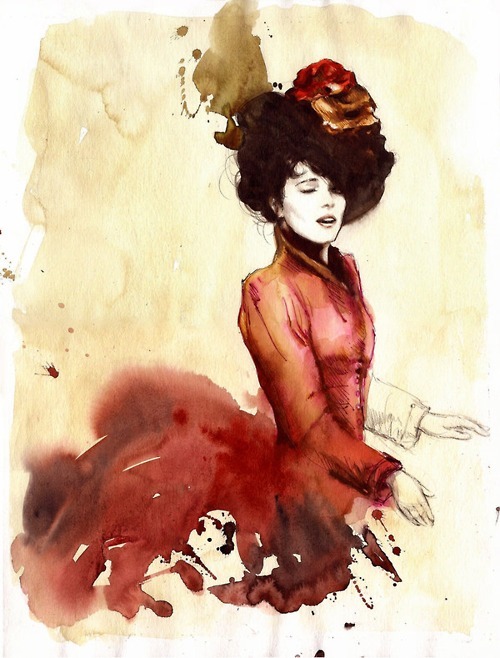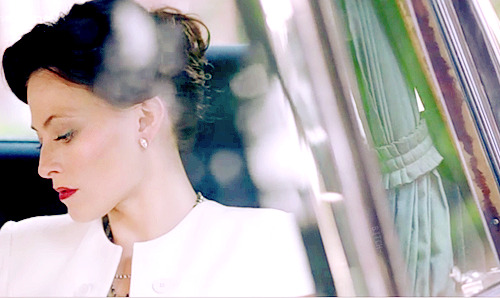SPOILER WARNING: This post discusses the plot of
Sherlock: A Scandal in Belgravia.
I enjoy
Sherlock as a show. It has
many faults, but I have respect for what it is doing and how it is trying to modernise Conan Doyle's stories. Some of the modern translations of Victorian plot points, tropes and 'gadgets' have worked extremely well and have been done with the writers paying great respect to the canon they were using. My compliments in this respect especially go out to Mark Gatiss for the episode
The Great Game in the first series and the way that the writers have so far treated the character of Moriarty.
However, no television show is flawless, or tries to be. Sherlock, for one, has always had problems with how it portrayed female characters, and these problems have only been accentuated with the first episode of the second series, A Scandal in Belgravia, aired last night.
 |
| Irene Adler in Sherlock Holmes, played by Rachel McAdams (source) |
Holmes's treatment of and attitude to women is that of a rescuer, which perpetuates the idea that women require to be rescued by men, that women are passive when in peril, and the only way they can be removed from a threatening situation is by male interference. Men, the narrative of
Sherlock shows us, are at their most manly when they are fighting side by side to rescue women. Sarah Sawyer, from
The Blind Banker, is an independent person – she is a doctor and a working woman who knows what she wants, and she is independent. She fights off Chinese smuggler acrobats like it's her job, until the very end of the episode, when she is captured and tied, and almost shot through with a spear. All her previous strength and independence is obliterated in order to serve the purpose of furthering the narrative, and, more importantly, to show her being rescued by a more successful and more able male protagonist – in this case, Holmes. All merit as strong female characters that she has had up to this point is lost, as she serves to further assert that masculinity is more powerful than and superior to femininity.
The myriad of women from various occupations and walks of life makes Sherlock a very modern work when it comes to the treatment of femininity. At the same time, however, it is steeped in nineteenth-century misogyny and sexism in the way these women are treated, both in the construction of the narrative and by the characters within it. Unlike the men, who are all (mostly) well-rounded and complex, the women in Sherlock serve as one-dimensional character types. In fact, the female characters are a typical example of the Victorian idea of binary coding of female identity, the Whore and the Virgin, if you will.
Female characters are seen through and defined by a male perspective, and not in their own right. In the first series, Sally Donovan is a sergeant of Scotland Yard, a position which she would have attained through extremely hard work, being both a woman and a person of colour, the only example of both of these traits in the all-male, all-white team. However, she is shown only through her negative history with Holmes, which has turned her bitter and reduced her dialogue to almost exclusively calling him 'freak'. Moreover, she is shown through her subordinate relationship with men, be it personal or private: she is both 'guilty' of office romance, the alleged partner in an alleged affair, for which Holmes openly
shames her in front of her colleagues. Molly Hooper is a pathologist at St Bart's Hospital – a position which would have taken her at least five years to qualify for – and yet she is characterised solely as being love struck and wide-eyed towards Holmes, even though he treats her with no respect.
The relationship that the Holmes we see in Sherlock has with its women is very much different to the kind of Holmes that Watson describes in The Adventure of the Dying Detective: 'He had a remarkable gentleness and courtesy in his dealings with women. He disliked and distrusted the sex, but he was always a chivalrous opponent.' In Sherlock, Holmes exploits women for being female, and he is far from courteous or gentle with them. He plays on the stereotypically 'female weaknesses' – emotions, vanity, and sexuality – in order to manipulate them into giving him what he wants. Women, as they are written in Sherlock, mainly through the pen of Steven Moffat, are body and nature, determined by and a slave to their emotions, hormones and instincts. Men, on the other hand, transcend their biological materiality and 'basic instincts' such as emotion or sexual desire: women are entrenched in their physicality. They can try to be like men, in the sense that they can try to conquer their emotions, but Steven Moffat teaches us, on the example of Irene Adler in A Scandal in Belgravia, that they can never succeed.
 |
| Irene Adler in A Scandal in Belgravia, played by Lara Pulver (source) |
In adapting
A Scandal in Bohemia or just involving Adler in other stories, most writers seem to forget (whether by accident or by design) that 'the woman' was the only person in the canon to
ever outsmart Holmes and leave him on her own terms. They also seem to forget that Adler had no romantic interest in Holmes – in fact, she was trying to marry Godfrey Norton, who is rarely even alluded to, or more often completely omitted from adaptations. The most recent unjust treatment that Adler received was in the 2009
Sherlock Holmes by Guy Ritchie, and you can read about that in more detail in Renee Cohn's excellent blog post,
A Defense of Irene Adler, in
two parts.
I had hopes for this modernised Irene Adler, and despite
Moffat's notorious history of failed female characters, most recently
seen in the Doctor Who Christmas special, I went into the episode with an open mind. The modern Adler is a sex worker and a dominatrix, a profession which is treated with an unexpected and welcome lack of prejudice by both the writer and the characters. She uses her intellect and her sensuality in an equal degree to achieve her goals: again, a welcome change to female characters (and previous Irene Adlers) who are shown as using sexuality as their only weapon. She is clever, capable, resourceful, and follows faithfully the Adler that Conan Doyle envisioned in
A Scandal in Bohemia in 1891, a time when New Women started redefining the meaning of femininity, and the strict rules that had up to then governed gender and sexual identity were starting to break down. Although femininity and masculinity are safe within their traditional frames in most of Conan Doyle's stories, Adler is one character that challenges them, and in the end outwits the super sleuth.
This refreshingly well-done portrayal of Adler is pulled off in
A Scandal in Belgravia in the first 90% of the episode. Adler plays a game of cat-and-mouse with Holmes and she is seen as always having the upper hand: at one point, she drugs Holmes and escapes, leaving him passed out on the floor. When she first meets Holmes, she is completely naked, not because she wants to present herself as an object to be lusted after, but because she knows that Holmes reads people based on their clothing, and that way she remains an enigma to him. Her clients are both male and female - the primary plot of the show is that she has some compromising photographs of herself with a female member of the Royal Family - and she identifies herself as gay in an exchange with Watson. A positive portrayal of a queer sex worker on prime-time television? It's almost too good to be true, since queer women in mainstream media are almost always erased or fetishised.
Unfortunately, Adler's self-identifying as gay is completely forgotten when Holmes enters her life. 'Brainy is the new sexy', she declares, and Holmes is able to beat her based on the fact that he deduces she is 'in love' with him because her heart rate increased when their hands touched and her pupils dilated when they were close. The issue here is not so much that lust and love are confused in a blatant display of ignoring basic biology, but rather that a presumably lesbian character has fallen in love with a man. Of course, I am not denying the fact that sexuality works very differently for each person and that it is fluid and subject to change: the problem with Adler falling head over heels for Holmes is the fact that she, as a queer woman, falls prey to erasure like so many before her. Up to this point, her sexuality was not the primary defining point of her character.
It goes further downhill from there: the viewer finds out that Adler's intellect and resourcefulness are not her own. She was helped by Jim Moriarty all along, and the narrative once again becomes the traditional Moffat story of women not being able to succeed independently. The point is rammed home at the end of the episode - a weeping, bound Adler (reminiscent of the one in
Sherlock Holmes) is saved from death by the heroic Holmes.
The message is clear: women cannot fight their own battles. They will always need a man to save them in the end, either from an outward threat, or from their own
misguided sexuality. Adler in
A Scandal in Belgravia had a lot of potential to be the best Irene Adler since 1891. She was independent, her sexuality was not her sole defining feature or primary weapon, and she outsmarted Holmes. And then, with a penstroke and a camera tilt, she was lying in Holmes's bed, a crying mess, she had let her emotions play her for a fool (the password to her phone was made to read 'I am Sherlocked', which, all previous things considered, could not be meant in an ironic manner), she was the pawn of Moriarty, and she had to be rescued by a strong, brainy masculine presence.
This starts out as a kind of Irene Adler that Conan Doyle wrote, and ends a twisted caricature of the fantastic, clever person from
A Scandal in Bohemia. Has Steven Moffat finally succumbed to a bad case of
George Lucas syndrome? And can female characters, queer or otherwise, hope for a good portrayal on the BBC if one of their most prominent writers has them put in the place he wants them, subordinate to men?


